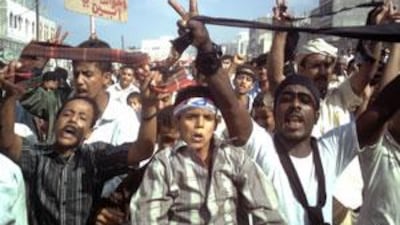SANA'A // A spokesperson for the Southern Movement, which is demanding the independence of southern Yemen, yesterday said the government must do more for families of the civilian victims killed or injured in an air strike in the Abyan village of al Maajala in December.
Local sources said more than 50 people, mostly women and children, were killed in the strike. "We do thank the parliamentary committee for the work it did but it is not enough for the government to apologise and compensate people. The blood of the southern people is not that cheap to just ask the government to apologise and compensate," Abbas al Assal said. The Yemeni government on Wednesday officially apologised to the families of the civilian victims of the attack and pledged to compensate them.
Mr al Assal said the parliament committee should have strongly condemned the attack, which the government said was aimed at rooting out al Qa'eda militants. "The parliamentary committee should have condemned the attack and hold the people behind it accountable. Therefore, we do reiterate our demands for an international investigation into the attack," Mr al Assal said. Government officials originally said as many as 34 suspected militants, including four would-be suicide bombers hiding in Arhab province, were killed in the December 17 attacks. The Abyan governor told the committee members that Mohammed Saleh al Kazemi, a leading militant, was among those killed, but admitted that only 14 militants were killed.
The committee report, which was discussed in parliament on Wednesday, said that the attack killed 41 civilians and wounded seven others. Following the attack, the Southern Movement organised protests to denounce the killing of civilians, sparking broad criticism by political parties and civil-society organisations, which then prompted parliament to set up the fact-finding committee. The report blamed the local authorities for not doing their job in "taking into consideration the consequences of the strike and besieging the site that enabled an armed group of al Qa'eda suspects to reach the site and take some of the dead bodies and injuries who belong to them".
It also found the strike was based on inaccurate information that caused many casualties among civilians and that it was easy for the government to arrest al Kazimi, who was wanted by the police in Abyan and Shabwa provinces. The report concluded that the state offices in Abyan were not doing enough to educate the citizens about the danger of the presence of al Qa'eda militants there and at the same time that al Maajala and its surrounding areas "lack the basic services necessary for the life of the people".
It also recommended that the government investigate the mistakes that accompanied the air strike and hold the perpetrators accountable, officially apologise to the families of the civilian victims and compensate them. It also said that the government should deal with the militants in a lawful manner. Several MPs harshly criticised the government on Wednesday, describing the incident as a "crime against humanity".
"The report is excellent and transparent. The incident is a mass killing with preconceived malice - the local authority people said they saw planes hovering over the area for days before the strike," said Sakhr al Wajeeh, an independent MP. The December 17 strike was followed on December 27 by another air attack in Shabwa province where the government claimed to have killed more than 30 suspected al Qa'eda militants. However, local sources said the strike had killed only two militants and wounded two others.
malqadhi@thenational.ae

